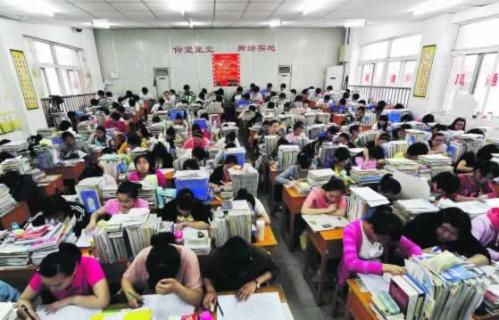导读:高考在即,全国各地的考生如何准备高考,当前中国各地高考的现状如何,让我们来一探究竟。

Hu Huifeng, an 18-year-old high school senior from China’s Jiangxi province, is on a strict regimen. Seven days a week she rises by 6am for a day of classes in Chinese, English, mathematics, chemistry, physics, and biology, with the last one finishing at 9.50pm. “once I get home, I study until midnight,” she says.
江西省18岁的胡慧凤目前正在按照一套严格的体系准备即将到来的高考。一周七天,她每天都要六点之前起床,然后分别学习语文、英语、数学、化学、物理以及生物等课程,最后一节课上完在晚上九点五十左右。胡慧凤表示:“每天回家,我还得学习到半夜。”
Hu is among the 9 million students preparing for the biggest test of their life: China’s annual college entrance examination. Called the gaokao, or “high exam”, it will take place over nine hours on June 7-8 across China. It’s the culmination of years of memorisation and test taking, capped off by at least 12 months of gruelling preparation. With its roots in the imperial examinations that started more than 2,000 years ago, the gaokao decides which school you want to go and what career you might have, says Mr Xiong Bingqi, vice president at the 21st Century Education Research Institute in Shanghai.
胡慧凤只是中国近九百万高考考生之中的一个普通例子。大学入学考试在中国被称作“高考”,一般在每年六月份的7号和8号两天进行,各科考试总时长可达九个多小时。近一年以来挑灯夜战的准备,多年来知识的积累,都将在这一刻蓄势而发。事实上在两千年之前,古代曾一度盛行科举制度,并在中国根深蒂固。 上海21世纪教育研究院的副院长熊丙奇谈到:“高考将会决定你要去哪所大学以及未来你要从事何种职业。”
The gaokao is an especially high hurdle for China’s more than 100 million rural students, who already receive an education of far lower quality than their urban counterparts. A quota system for allocating coveted college slots by province, which greatly favours local students, also works against rural youth who often live far from the better universities and need higher test scores than local applicants to gain admission. “The current system itself is unfair,” Mr Xiong says. “Inequality is inevitable.”
对于中国1亿多名农村学生来说,高考可谓是一个高门槛,因为他们接受的教育质量普遍比那些城市里的学生要低。各省的定额分配制度通过各省来招收大学生,他们一般都将政策偏向本地考生。然而这种制度对于那些距离著名大学地域较远的考生非常不公平,他们需要比那些大学当地的考试多考很多分才可能有资格被录取。熊丙奇谈到:“这种体制事实上是不公平的,但这种不平等却无法避免。”
The problem stems from household registration (hukou), which ties all social benefits, including education, to one’s hometown or village. The hukou forces most rural students, many of whom are children of migrant workers, to take the gaokao where their parents hail from, even if they’ve never lived there.
这种问题的根源来自于户籍制度,即平常所说的户口。这种制度将包括教育在内的各种社会福利与家庭所在地联系在一起。户口制度让大多数外来民工子女都必须回户口所在地去参加高考,即使之前他们从来没有住在该地。
Hu’s father managed to keep her in school until sixth grade in Huizhou, Guangdong, where he was once a migrant worker and now runs a lighting factory. At the age of 12, Hu, like her brother before her, returned to her parents’ rural hometown more than 600km away to live with her grandparents in Jiangxi and go to high school.
胡慧凤的父亲终于成功在其六年级的时候让她在广东省惠州上学。之前,胡慧凤父亲在惠州打工,目前正在经营自己的一家灯具厂。在胡慧凤12岁的时候,她和自己的哥哥一样,回到离惠州近六百公里之外的老家,和外祖父母住在一起,在那里参加高中课程的学习。
Poor provinces spend far less on their schools than do wealthier coastal cities. (about one-third of rural students attend large boarding schools of questionable academic quality.) In Shanghai, the average amount spent per elementary school student in 2014 was 14,518 yuan (S$3,000), while less-well-off Guizhou province spent only 3,237 yuan. On average, rural students score 40 points lower on the gaokao, 21st Century’s Xiong says.
贫困省区在学校里的花费远比那些富裕的沿海城市学校的花费要少。(大概有三分之一的农村学生选择住宿学校,教育质量不能得到保证。)据统计,上海各小学的学生们2014年人均花费在14518元左右(约合3000美元),然而在比上海生活水平相对较低的贵州省,人均花费仅在3237元左右。21世纪教育研究院的副院长熊丙奇提到:平均来看,乡村地区的学生在高考中所得的分数相对要低40分左右。
The gaokao’s all-important role in admissions is being reduced by giving universities more freedom to choose students based on class grades and teacher recommendations. The authorities are ordering public schools in Guangdong’s Pearl River Delta and other regions to take in more migrant children and let them take the college entrance exams where their parents work. And the quota system is being tweaked to allow more students from the poorer central and western regions to go to better universities in the east.
现如今大学有自由通过课程分数以及教师推荐来提前招收学生,这使得高考这个重要的角色在招生方面的作用有所减弱。国家有关部门要求广东珠三角地区的学校以及其他地区招收更多的农民工子女,并让他们在父母工作的地区参加高考。相关配额制度也有所改革,允许更多来自中西部贫困地区的学生有机会到东部沿海地区更好的大学接受教育。
The costs of migrant children entering new schools will burden local governments. And families in cities who have benefited from the unequal system are resisting change. When officials recently announced plans to allow 78,000 students from poor regions to enter colleges in the better-off provinces of Jiangsu and Hubei, protests flared. “Governor, come out!” chanted angry parents outside government offices in mid-May in Nanjing, Jiangsu. They worried that new students would harm their children’s university prospects, Chinese media reported. Local education officials later reassured parents that the numbers of local students getting into Jiangsu universities would not fall.
然而,这些入学的农民工子女的相关花费给当地政府造成了不小的负担。另外,之前一直从这种不公平体系中受益的家庭也对此表示不满。当政府官员最近宣布最新计划允许78000名来自贫困地区的学生可以到诸如江苏、湖北较为富庶的地区上大学,抗议声便从四面八方顺势涌来。五月中旬,愤怒的学生家长在江苏省南京政府办公室外破口大骂:“你们领导呢!出来!”据媒体报道,这些家长担心这些贫困地区学生的流入将会对自己孩子的大学前程有所影响。后来,当地教育部门的领导向父母保证:当地学生进入省内大学的指标数目不会降低。
Some young Chinese feel the inequities keenly. “Students in Beijing can get into Peking University with lower scores than us in Jiangxi, but there’s nothing we can do,” frets Hu, who still aims for a top school. “Unfortunately, for many other ordinary students like myself, gaokao is the sole path to realise our dreams,” wrote Chengdu student Liu Yangxiu on WeChat. She was too busy studying to speak over the phone.
一些学生深切体会到这种制度带来的不公。“北京当地的学生即使分数没有那么高也可以轻松进入北大,但是我们江西的学生就不行。”胡慧凤说道,她的梦想就是能够进入中国的高等学府。来自成都的一位学生刘阳秀因学习太忙没有时间在电话上说明,便通过微信表示道:“不幸的是,对于我们这种普通学生来说,高考是可以帮助我们实现梦想的唯一途径。”